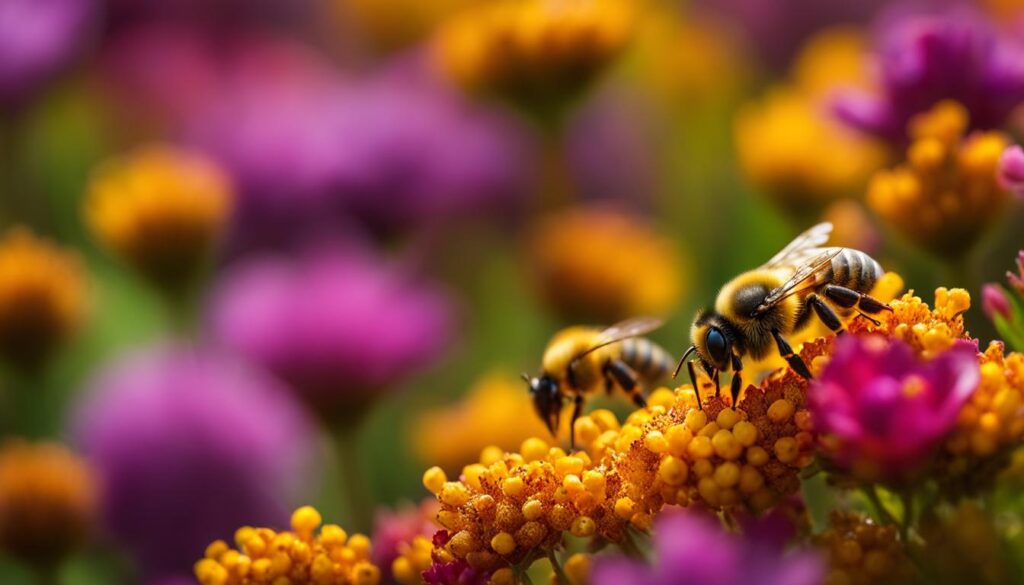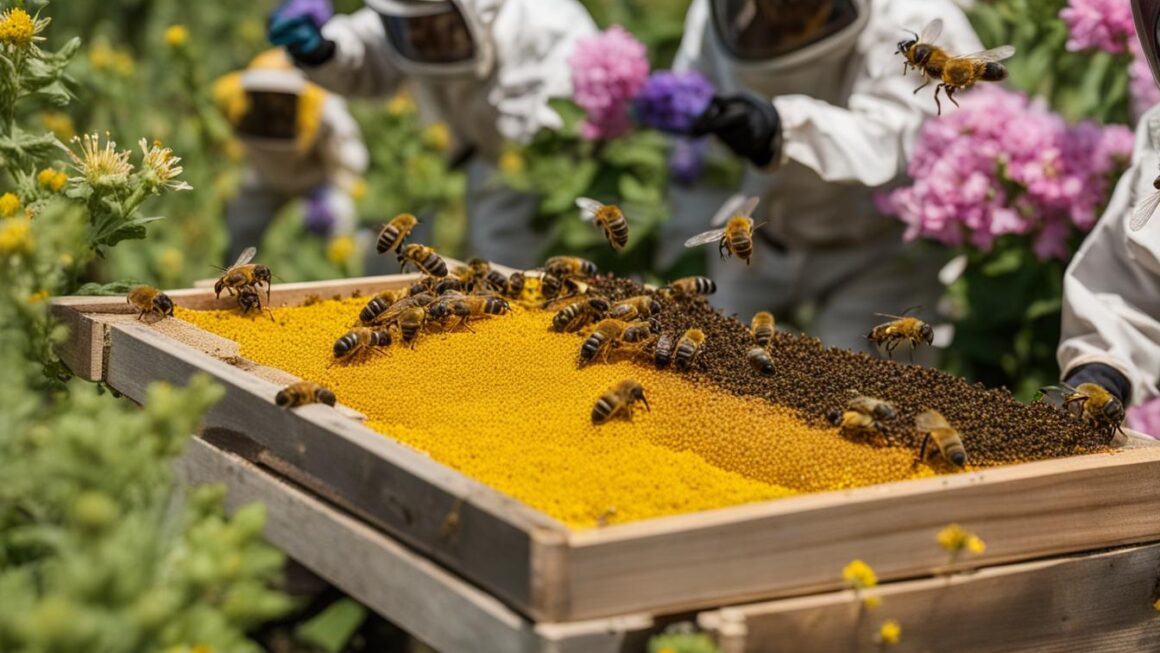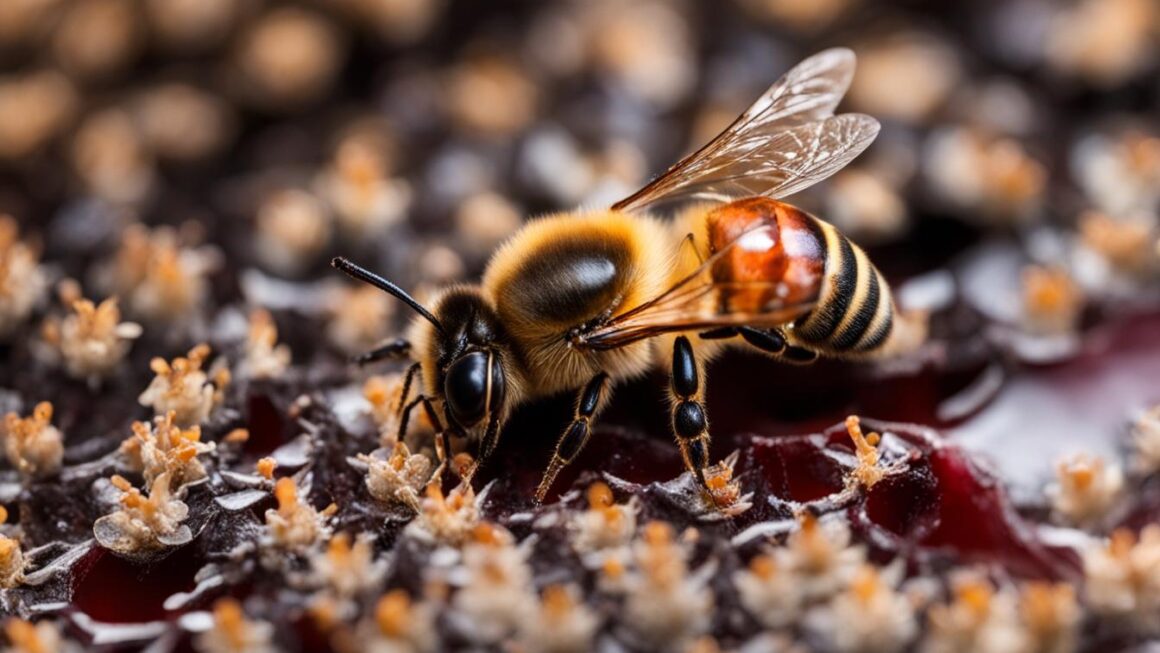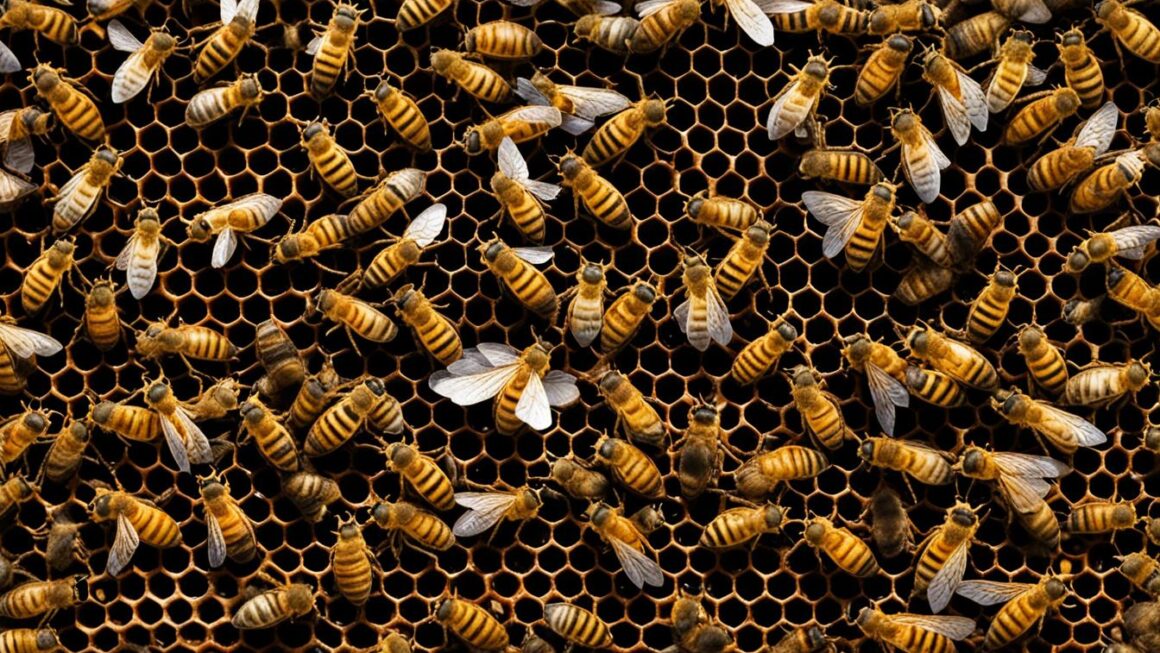Bee pollen is a natural superfood known for its numerous health benefits. It is packed with essential nutrients like protein, vitamins, and minerals, and has been found to have antioxidant and anti-inflammatory properties. However, many people are unsure how to obtain bee pollen and may not know where to start. In this comprehensive guide, we will explore different ways to get bee pollen, including buying organic bee pollen, harvesting it yourself, and finding it from alternative sources.
Key Takeaways:
- Bee pollen is a natural superfood packed with essential nutrients and health benefits.
- There are different ways to obtain bee pollen, including buying organic bee pollen, harvesting it yourself, and finding it from alternative sources.
- Before getting bee pollen, it is important to understand its benefits and potential allergenic considerations.
- For those interested in harvesting bee pollen, proper equipment and safety precautions are necessary.
- Consuming bee pollen in its natural form or as a supplement can both offer health benefits, but dosage and quality considerations are important.
Understanding Bee Pollen and Its Benefits
Before learning about how to acquire bee pollen, it’s crucial to understand what bee pollen is and why it’s rapidly gaining popularity as a superfood. Bee pollen is a mixture of plant pollen, nectar, enzymes, honey, and wax that bees collect and store in their hives.
One tablespoon of bee pollen contains roughly 16 calories, 1 gram of protein, and 2 grams of carbohydrates. It is a rich source of vitamins, minerals, and antioxidants, making it a valuable addition to any diet.
Health Benefits of Bee Pollen
The nutritional value of bee pollen can have various health benefits, such as:
- Reduced inflammation
- Improved immune function
- Increased energy levels
- Enhanced digestion
- Lowered cholesterol levels
Furthermore, studies have shown that bee pollen might possess anti-tumor and anti-cancer properties, and have the potential to improve heart health and support liver function.
To maximize the benefits of bee pollen, it’s essential to ensure that you’re consuming the best quality product. Whether purchased or harvested, proper storage and freshness are crucial factors to consider for optimal nutrition and benefits.
“Bee pollen is a wonderful addition to any diet. It’s high in vitamins, minerals, and antioxidants that can provide numerous health benefits.”
Buying Organic Bee Pollen
When it comes to purchasing bee pollen, it is essential to choose the best quality organic product. Here are some factors to consider before making your purchase:
| Factor | Considerations |
|---|---|
| Source | Choose a reputable source that follows sustainable and ethical practices. Check if they have certifications such as USDA Organic, Non-GMO Project Verified, or GMP (Good Manufacturing Practices). |
| Form | Bee pollen comes in various forms such as granules, powder, capsules, and tablets. Consider which form is most convenient for you to take and which is of better quality. |
| Color and Texture | High-quality bee pollen has a vibrant color and a granular texture, while low-quality pollen may appear dull and powdery. Ensure the texture is not moist or clumpy, as it could be a sign of poor storage, low-quality pollen or even contamination. |
| Storage Recommendations | Ensure the bee pollen is properly packaged and stored to prevent degradation of nutrients. Keep it in a cool, dry, and dark place to maintain freshness, and avoid exposure to sunlight or heat. |
If you have access to local beekeepers, it is also possible to find local, fresh bee pollen. However, be sure to check their practices and ask about any chemical treatments they may use on their hives.
Whether you decide to purchase or harvest your bee pollen, choosing the best quality available will ensure you get the most out of this natural superfood.
Harvesting Bee Pollen
If you are interested in harvesting bee pollen, it is important to understand the process and take the necessary precautions to ensure your safety and the health of the bees.
The first step is to set up a pollen trap on your beehive. This can be purchased from a beekeeping supply store or made at home using a wooden box with an entrance for the bees and a mesh screen for collecting the pollen. Ensure that the pollen trap is properly installed and securely attached to the beehive.
Once the pollen trap is in place, the bees will start collecting pollen and storing it in the pollen baskets on their legs. The pollen will fall through the mesh screen and collect in a tray below. To prevent the collection of any debris or dirt, ensure that the pollen trap is cleaned and maintained regularly.
When harvesting the pollen, use a small paintbrush or scraper to gently remove the pollen from the mesh screen. Avoid using your hands, as this can damage the pollen and introduce bacteria to the hive. Transfer the collected pollen to a clean and dry storage container, such as a glass jar.
It is important to note that bees require pollen as a vital source of nutrition, so do not harvest more than 20-30% of the pollen collected by your hive. Additionally, ensure that your hive has enough pollen stores for the winter season.
Harvested bee pollen may contain some wax and other debris, so it is recommended to clean the pollen before consuming it. To do this, place the pollen in a fine mesh strainer and rinse it with cool water. Spread the damp pollen in a thin layer on a clean towel or paper towel and let it air dry for a few hours before transferring it to a storage container.
Harvested bee pollen is best consumed fresh, as it can lose some of its nutritional value over time. Store your bee pollen in a cool, dark place to extend its shelf life.
Where to Find Bee Pollen
If you prefer not to purchase or harvest bee pollen directly, there are still several options available to you. Here are some suggestions for where to find bee pollen:
- Local farmers’ markets: Many farmers’ markets carry local bee pollen from nearby beekeepers. This is a great option if you want to support your local community and purchase bee pollen that is fresh and minimally processed.
- Health food stores: Health food stores often carry a variety of bee pollen products, including raw bee pollen, encapsulated bee pollen, and bee pollen supplements. Check the product labels to ensure you are buying high-quality, organic bee pollen.
- Online suppliers: There are many online retailers that specialize in selling bee pollen products. Before making a purchase, do your research to ensure the supplier is reputable and offers quality products.
When purchasing bee pollen, it is important to look for local sources whenever possible. Local bee pollen is often fresher and more nutritious than pollen that has been shipped from afar. Additionally, purchasing local bee pollen supports local beekeepers and helps to sustain bee populations in your area.

Overall, consuming natural bee pollen can be a great way to improve your health and wellness. Just remember to start with a small amount, find a reliable source, and experiment with different ways to incorporate it into your diet. The benefits are worth it!
Maximizing the Health Benefits of Bee Pollen
As mentioned earlier, bee pollen is a natural superfood that offers a myriad of health benefits. However, to fully reap its benefits, it is crucial to ensure that you are getting the best quality product and consuming it in the right way.
The quality of bee pollen can vary widely depending on factors such as the source, processing methods, and storage conditions. To ensure that you are getting the best quality bee pollen, it is recommended to buy from trusted sources that offer organic and non-irradiated bee pollen.
Proper storage is also important in maintaining the freshness and nutritional value of bee pollen. It should be kept in a cool, dry place away from direct sunlight and moisture. Additionally, it is important to start with small doses of bee pollen and gradually increase the amount to avoid any potential allergic reactions.
So, what are the specific health benefits of bee pollen? Studies have shown that bee pollen can boost the immune system, reduce inflammation, enhance liver function, and improve athletic performance. It is also rich in antioxidants, vitamins, and minerals such as zinc, magnesium, and iron.
To further maximize the health benefits of bee pollen, consider incorporating it into a balanced and healthy diet. Here are a few ideas for using bee pollen:
- Sprinkle it on top of smoothie bowls or yogurt parfaits
- Mix it into oatmeal or granola
- Add it to salad dressings or sauces
- Use it as a natural sweetener in baked goods
Remember that bee pollen is a supplement and should not be used as a replacement for a varied diet. Consult with a healthcare provider before incorporating bee pollen into your diet, especially if you have pollen allergies or are pregnant or breastfeeding.
By ensuring that you are getting the best quality bee pollen and consuming it in the right way, you can fully maximize the numerous health benefits that this natural superfood offers.
Conclusion
After exploring the various methods of obtaining bee pollen, it is clear that incorporating this natural superfood into your diet can offer a plethora of health benefits. Whether you choose to purchase organic bee pollen, harvest it yourself, or explore alternative sources, bee pollen is a versatile and nutritious addition to any diet.
For those interested in buying bee pollen, it is important to consider factors such as the source of the pollen, certifications, and storage recommendations to ensure you are getting the best quality product. If you prefer a hands-on approach, harvesting bee pollen from your own beehives can be a rewarding and sustainable practice.
For individuals who prefer the convenience of supplements, there are various forms of bee pollen supplements available with recommended dosage considerations. Alternatively, consuming natural bee pollen can offer a unique sensory experience with different flavor profiles and dietary uses.
Maximizing the Health Benefits of Bee Pollen
Regardless of the method of obtaining bee pollen, there are ways to maximize its potential health benefits. Storing bee pollen in a cool, dry place can help maintain freshness and potency. It is also important to consider potential allergenic considerations and begin with small doses to gauge tolerance.
By incorporating bee pollen into your diet, you can benefit from its nutritional value including antioxidants, amino acids, and vitamins. Additionally, bee pollen has been linked to various health benefits such as decreased inflammation, improved immune function, and increased energy levels.
Overall, bee pollen is a natural and nutritious superfood that can be enjoyed in various forms. Start your bee pollen journey today and reap the rewards of this versatile and sustainable ingredient.
FAQ
How do I obtain bee pollen?
Bee pollen can be obtained by either buying organic bee pollen or harvesting it yourself from beehives.
What is bee pollen and what are its benefits?
Bee pollen is a natural superfood that offers numerous health benefits. It is rich in nutrients and can support immune system function, increase energy levels, and promote overall well-being.
How do I buy organic bee pollen?
When buying organic bee pollen, consider factors such as its source, certifications, and storage recommendations. Look for trusted suppliers and ensure the product meets your quality standards.
How do I harvest bee pollen?
Harvesting bee pollen involves using specific tools and equipment, taking safety precautions, and following proper techniques for successful pollen collection. It is recommended to research and learn from experienced beekeepers before attempting to harvest bee pollen.
Where can I find bee pollen?
Bee pollen can be found in various places, including farmers’ markets, health food stores, and online suppliers. These sources provide accessibility for individuals who prefer not to buy or harvest bee pollen themselves.
What are bee pollen supplements?
Bee pollen supplements offer a convenient way to incorporate this superfood into your daily routine. They come in various forms and can be taken according to recommended dosage guidelines. It is important to choose a high-quality supplement from a reputable brand.
How can I include natural bee pollen in my diet?
Natural bee pollen can be consumed directly, added to smoothies, sprinkled on top of salads or yogurt, or used as a topping for granola or desserts. It has a unique flavor profile that can enhance the taste of your favorite foods.
How can I maximize the health benefits of bee pollen?
To maximize the health benefits of bee pollen, ensure you are getting the best quality product by considering factors such as storage, freshness, and potential allergenic considerations. Follow recommended storage guidelines and consult with a healthcare professional if you have any concerns.




